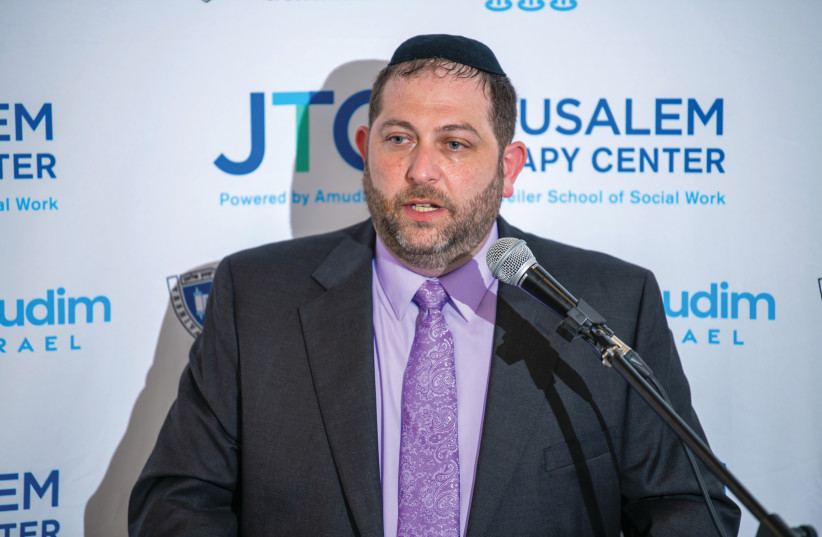Amudim and Zvi Gluck are helping manage mental health crises among Jews

To date, Amudim has helped more than 14,000 individuals. This is alongside thousands of active cases in Israel and abroad.
Situated behind the Jaffa Center light rail station is an unassuming building. The thousands who walk by it have no idea that long-standing problems are being solved on the top floor. The clinic, home to Amudim, is the result of years of work by Zvi Gluck to unpack the Jewish world’s many problems and solve them.
Growing up in a home where community service was at the forefront, Gluck never thought that his life would end up where it is now. He started his professional career in business, far from the nonprofit world. It was not until two of his close friends died – one from drugs and one from abuse – that he shifted his focus to helping the downtrodden.
Gluck spoke to the Magazine to discuss his organization’s roots and its journey to helping thousands today.
Helping destigmatize sexual abuse in the Orthodox Jewish community
Amudim was founded in 2014 with the initial mission statement of “destigmatizing sexual abuse within the Orthodox Jewish community.” An unfortunate yet typically hidden problem plaguing all communities is sexual abuse, where individuals are abused sexually by friends or family.
Despite the obvious issue of the abuse occurring, it is often not reported due to the nature of the relationship between the victim and the abuser. As a result, victims may hide their abuse for decades, culminating in deep trauma that impacts all aspects of their personal and professional lives.
Amudim depicted the problem in one of its PSA videos (public service announcements) called Shattered. The gut-wrenching PSA, one of many that have received hundreds of industry awards, reached across demographic groups to show just how easily people can fall victim to abuse, and how it can ruin their lives. Gluck noted that the Christian Evangelical Right in the United States tried getting Facebook to ban the video from its platform.
As a result of sexual abuse, they noticed that drug addiction or suicide can be the ultimate step for the victim. This led the organization in 2014 to host a conference with leading experts in the field designed to “find target points” for tackling abuse. Approximately 30 points were found, which the attendees sat down to discuss at the conclusion of the conference.
According to Gluck, while reviewing the results, the attendees realized that it was not enough to be “just an awareness organization. We needed to do case management, too.” This is because it is critical in the recovery cycle of victims to have a specific case manager who is assigned to them, ensuring that the process is successful.
Recognizing this need, they worked to develop an A-Z process, starting with hiring social workers to assist victims. From there, the process is to “validate, establish proper information, find adequate help and enlist close friends.”
Amudim’s policy is not to charge any money for organization-specific work. “We just want to help people… Money can be a big issue,” Gluck says.
OTHER PSA videos and initiatives that the organization has adapted to remedy are alcoholism and drug addiction. In one particularly moving and relevant PSA called The Kiddush Club, a child is shown tagging along his father while he drinks a glass of alcohol, which is a common tradition between the Torah reading and Musaf service on Shabbat morning. As the child grows older and continues to see this occurrence, he eventually is intrigued by alcohol, abusing it himself even in school.
Gluck explains this PSA, lamenting that “the problem with PSAs is that we make them only after the fact.” He points out that alcoholism is a huge issue in the Orthodox community, as “in Judaism, drinking is integral from birth to death… As we grew, we noticed the issue, especially in teens and adolescents.”
He points out that alcohol has become so personified in the act of households prominently displaying attractive or expensive bottles of liquor for guests. “I don’t have alcohol on display in my home,” Gluck says, adding, “I am not pro-prohibition, I am pro-moderation.”
With all issues, particularly alcohol, Gluck says that children learn from their parents; and if they see them engaging in destructive practices, they are more likely to take them on themselves. “It also teaches them not to see the value in other things… By attending the Kiddush Club, they are missing the haftorah and the rabbi’s speech.”
Educating young children to hone in on the message
PROBLEMS SUCH as this have led Amudim to establish programs in schools to educate children when they are still young enough to hone in on the message.
However, they realized quickly that the programs were not really working. Back to the drawing board, they saw the potential impact of SEL (social-emotional learning) as an effective tool. SEL works by helping children learn skills of self-awareness and control, with the hope of translating that into a more open dialogue and understanding of problems they may be seeing.
Amudim built an in-house SEL tool “with the goal of promoting healthy decision-making and fostering friendships and interpersonal relationships.”
In the pilot program last year, 500 students took part, with 400 families engaging with the organization further. A part of this is that Amudim knows that not every problem is its specialty to solve. In these cases, it has relationships around the world to guide the person seeking help in the right direction.
Opioids are a huge issue facing youth today, with many becoming addicted to the drugs following surgery or an event requiring short-term pain medication. A taboo topic in Jewish circles, hundreds of teens and young adults die every year from overdoses.
Amudim has assisted in distributing more than 11,000 Narcan cans – emergency medication that can save someone from overdosing on opioids – to communities. It also offers prevention and education resources.
WHEN IT COMES to finding help, taking the first step is often the hardest. Gluck estimates that approximately half of the people who come to Amudim come on their own, while the other half are called in by friends or family.
Something Gluck stresses, “I don’t believe in the idea that you can only help people when they want to accept help.” He says this because the commonly held notion that someone can only find help when they “hit rock bottom” doesn’t cut it anymore. Rock bottom often means death nowadays, with fatal drugs such as fentanyl plaguing the streets.
To this, Gluck says it is crucial to understand how to guide a third party to help their loved ones going through addiction or fallout from abuse:
- Understand that the person is not the same person that he/she is when on drugs or dealing with trauma. This can often be tough, as addicts may lash out at their loved ones, thinking they wish them harm. Gluck says that you need to separate the two. He emphasizes that “perception is reality” in the sense that when people think they are alone, they are alone.
- Be practical. Change does not happen overnight, but it can occur in time if people are given the proper resources and professional help.
- Keeping up with them is key to long-term success. “Getting them clean is one thing. Keeping them clean is another.”
A clinic in Jerusalem to help Anglos in Israel
TO ASSIST the many Anglos living in Israel, either having made aliyah or spending time in yeshiva, Amudim set up its new Jerusalem center. Most of the people going through the center are teens and adolescents.
The center opened in partnership with Yeshiva University’s Wurzweiler School of Social Work, something Gluck speaks proudly about. “The YU partnership is a win-win for us both. We were looking for a way to provide excellent therapy at an affordable price, and YU was looking for a clinic for its students to become interns. This way, we can get quality therapists alongside the students, providing care and ensuring the next generation of therapists who are being properly trained.”
To date, Amudim has helped more than 14,000 individuals. This is alongside thousands of active cases in Israel and abroad.
As some of Amudim’s work has resulted in prison sentences for abusers, Gluck and his organization have faced intense criticism from members of both sides of the political spectrum. The calls come in either accusing him of desecrating God’s name or protecting those in power.
This, however, does not stop Gluck. He says that their voices are not important to him; only the people whose lives he is impacting matter.
Gluck shares a voice recording from someone who went through Amudim’s program, saying how Gluck’s work has changed his life. It is moving and powerful, yet to Gluck it is natural.
Gluck ends every speech he gives with the same message: “I hope we can be out of business soon.” He recognizes, though, that the problems he is tackling have no overnight solution, so for him, working every day to help the helpless will continue to be his life’s mission.
If you or a loved one is experiencing trauma from a past or present assault, dealing with drug addiction or alcoholism, or contemplating suicide, you can contact Amudim by calling in Israel: (02) 374-0175; or in the US: (646) 517-0222. Website: amudim.org/. The Jerusalem clinic is located at 3 Nathan Strauss Street.
Jerusalem Post Store
`; document.getElementById("linkPremium").innerHTML = cont; var divWithLink = document.getElementById("premium-link"); if (divWithLink !== null && divWithLink !== 'undefined') { divWithLink.style.border = "solid 1px #cb0f3e"; divWithLink.style.textAlign = "center"; divWithLink.style.marginBottom = "15px"; divWithLink.style.marginTop = "15px"; divWithLink.style.width = "100%"; divWithLink.style.backgroundColor = "#122952"; divWithLink.style.color = "#ffffff"; divWithLink.style.lineHeight = "1.5"; } } (function (v, i) { });


